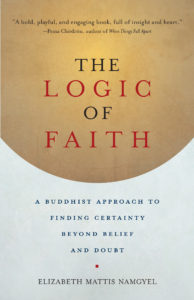Interview By Janae Jean and Spencer Schluter –
For this mid-month interview, we had the pleasure of speaking with Elizabeth Mattis Namgyel. Elizabeth is a Buddhist teacher and author of The Logic of Faith: The Buddhist Path to Finding Certainty Beyond Belief and Doubt and The Power of An Open Question: The Buddha’s Path to Freedom. She has studied and practiced Mahayana Buddhism, as well as the Vajrayana tradition, for over 30 years under the guidance of her husband and teacher, Dzigar Kongtrul Rinpoche. She is the Retreat Master at Longchen Jigme Samten Ling, Mangala Shri Bhuti’s retreat center in southern Colorado and teaches throughout the United States and Europe.For more information about Elizabeth and her work, visit www.elizabethmattisnamgyel.com. Connect with her via Facebook @ElizabethMattisNamgyel, on Twitter @EMattisNamgyel and on Instagram @ElizabethMattisNamgyel.
The following is just a snippet of our conversation, for more on faith, interdependence, the human condition, keeping things in perspective and the importance of self-love scroll to the player at the bottom of the page. Subscribe to the Conscious Community Podcast on iTunes, GooglePlay, PlayerFM, Stitcher, TuneIn and YouTube to stay up-to-date with our latest interviews. Don’t forget to “like,” comment and share us with your friends.
Janae: Your book is The Logic of Faith. What do you mean by “faith” in this book? It seemed to me to be different than what a lot of Westerners mean they say “faith.”

Elizabeth: There are many different definitions of faith. It seems like everyone you ask describes faith in a different way. Even if you look in the Oxford English Dictionary, you’ll find all kinds of definitions such as “dogma,” “doctrine,” or “fanaticism.” While on the other hand there’s “spiritual awakening.” There’s many opposing meanings. Me, I was really interested in faith as an experience. But, when I looked at what faith meant in the content of our cultural understanding of it, I found many different meanings. So, it made me interested. I started to ask myself “What is faith in the context of the human condition?” When you look at the word “faith,” it implies there’s something we don’t know. We don’t even know what’s going to happen in the next five minutes. Let alone, the way we see things is very different; the way we understand things is very different. That’s just part of being human and living in a world where things are constantly changing. We have subjective understanding of what things are. So, I started to ask myself “Can you even live in a world without faith?” Faithing…I often talk about faith as a verb in this book. What does it mean tofaith? What does it mean to live in a very open and curious way in the world where you only see a little piece of thing? Faith seems very important to understand in the context of the human condition. So, I explored it on a personal level and a cultural level.
JJ: I think it’s very interesting that you do see it that way. You mentioned that you have realized that you have been kind of fundamentalist in certain ways. People have a very fundamentalist idea of what faith is in our culture.
Spencer: It seems that faith is oftentimes defined as “These are the beliefs that you have that no matter what evidence or arguments you are confronted with, you are not going to change.” That’s really how faith has come to be broadly defined.
 EMN: I confront that myself sometimes. For example, I have noticed in myself this rigidity in my belief systems, like I’m really limited in the way I move about the world. The spiritual experiences I’ve had, as I call them in my book experiences of grace, are very open and not closed down and can bear a lot of complexity and not-knowing. So, as an experience, faith feels very open, fluid, not dogmatic, not this fundamentalism or clinging to beliefs. Its open, engaged and connected to many different perspectives and ways of looking at things. Culturally, I felt what you’re talking about. A lot of times when I’ve tried to teach about faith, when I use the word “faith” people get agitated and don’t want to come to the talk. They don’t want to explore it; they’re already decided what it is and they already have a belief about what faith is. They’re not interested in looking more deeply at it. I get comments like “That’s just blind; faith is blind and how can you be interested in that?” That’s when I started to call it the “f-word.” When I started to call it the f-word, people started to get interested and to explore this with me.
EMN: I confront that myself sometimes. For example, I have noticed in myself this rigidity in my belief systems, like I’m really limited in the way I move about the world. The spiritual experiences I’ve had, as I call them in my book experiences of grace, are very open and not closed down and can bear a lot of complexity and not-knowing. So, as an experience, faith feels very open, fluid, not dogmatic, not this fundamentalism or clinging to beliefs. Its open, engaged and connected to many different perspectives and ways of looking at things. Culturally, I felt what you’re talking about. A lot of times when I’ve tried to teach about faith, when I use the word “faith” people get agitated and don’t want to come to the talk. They don’t want to explore it; they’re already decided what it is and they already have a belief about what faith is. They’re not interested in looking more deeply at it. I get comments like “That’s just blind; faith is blind and how can you be interested in that?” That’s when I started to call it the “f-word.” When I started to call it the f-word, people started to get interested and to explore this with me.
Nowadays, people like the writer Sam Harris about the end of faith. In his last book he said, “Why can’t be replace the word ‘faith’ with ‘spirituality?’” And, I thought well spirituality can be anything you want it to be. So, your ego can make it anything it wants it to be. If you are always making a comfortable spirituality for yourself, there’s no avenue for transformation. One has to challenge the ego to open up a little bit. I think faith is a much more provocative and interesting word because it pushes against a lot of our preferences. And, it pushes against this idea that we can even fix the world or make it what we want it to be because the world is dynamic, rambunctious and lively. There’s so much that we don’t know. So, I like the word faith. I think it’s something we can reconsider as part of what it means to be a human being and live in an uncertain world…and be brave in the face of this and find some openness and joy in that. I just think spirituality is too easy. It’s too easy to dismiss a word and not really look into what it actually…it can mean many different things. Also, I wonder what it means as an experience for people. What does that mean to have faith or to faith as a verb?
Janae Jean serves as editor, social media manager and podcaster for Conscious Community Magazine. She has an extensive background in new media and music education. Janae is actively researching using electronically generated sounds for healing.
Visit www.janaejean.com and www.perennialmusicandarts.com for details about Janae’s upcoming classes, lesson information, workshops, shows, articles and projects.
Spencer Schluter is the advertising account manager, social media manager and podcaster for Conscious Community Magazine. His experience includes visual communications, advertising, social media, marketing, public relations and business development. Visit www.yggstudios.com for more information about his freelance design and consulting work. He is also a master level Reiki and traditional Chinese Qigong practitioner.
Podcast Theme Music: Sublimation (Theme from the Conscious Community Podcast)
Janae Jean Almen and Spencer Schluter, composers SpindriftGreenMusic Publishing ©2017
Podcast: Play in new window | Download
Subscribe: RSS
 Conscious Community Magazine Dedicated to Elevating Consciousness
Conscious Community Magazine Dedicated to Elevating Consciousness





